人教版(2019)选择性必修第一册Unit 2 Looking into the Future Listening and Speaking课件(共26张PPT,内镶嵌音频)
文档属性
| 名称 | 人教版(2019)选择性必修第一册Unit 2 Looking into the Future Listening and Speaking课件(共26张PPT,内镶嵌音频) | 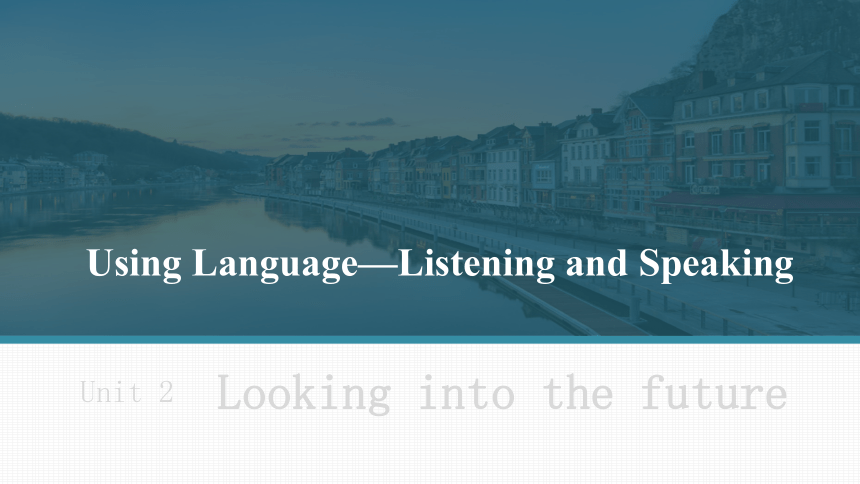 | |
| 格式 | pptx | ||
| 文件大小 | 30.7MB | ||
| 资源类型 | 教案 | ||
| 版本资源 | 人教版(2019) | ||
| 科目 | 英语 | ||
| 更新时间 | 2023-09-05 17:57:21 | ||
图片预览

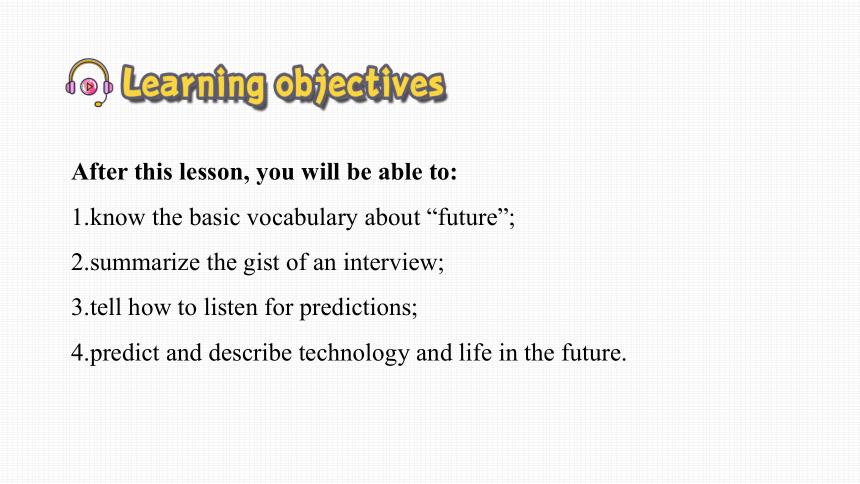
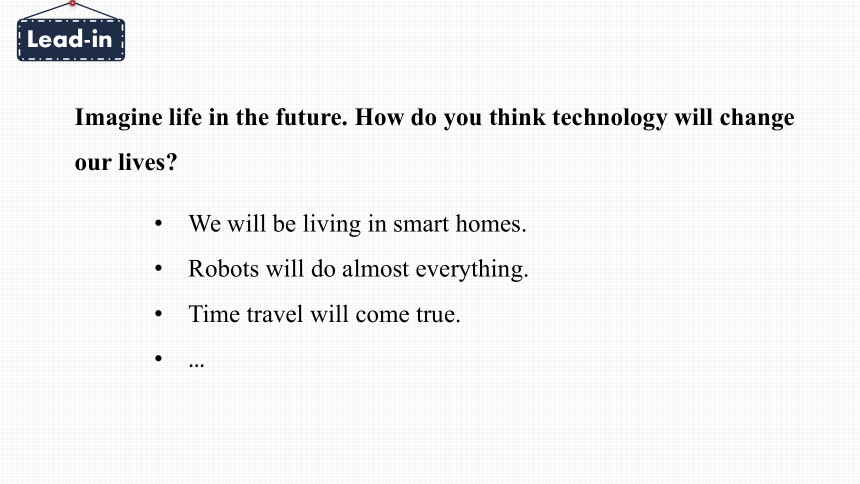
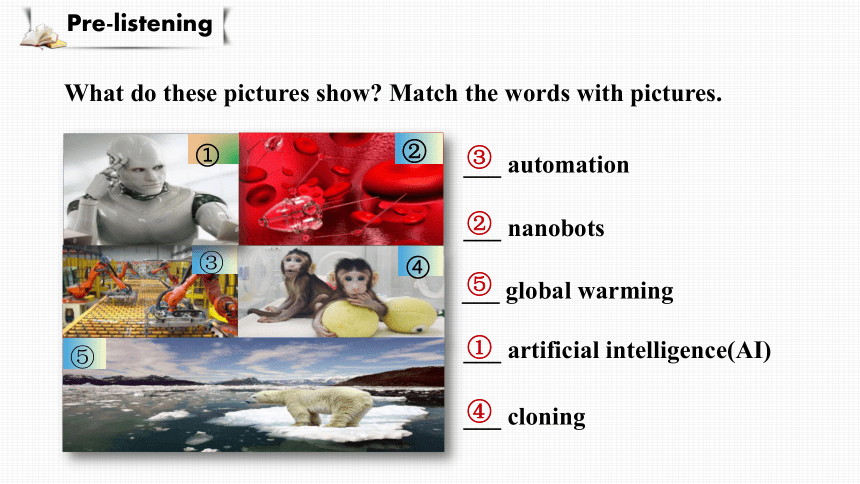
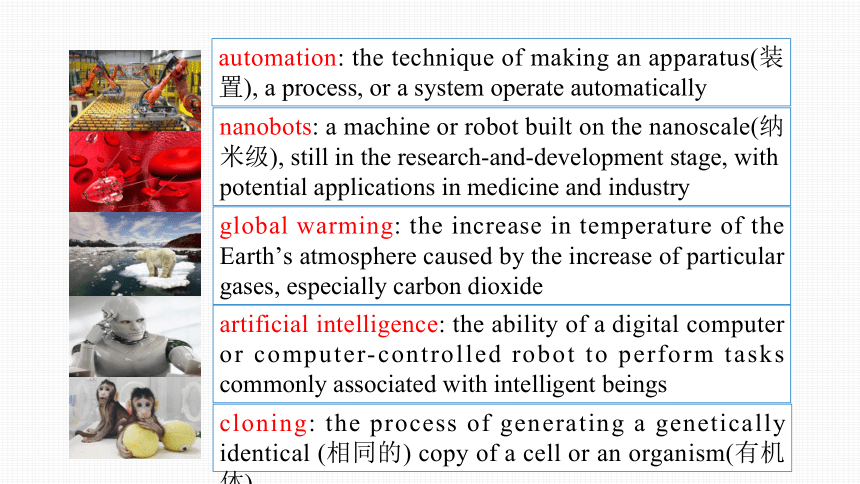
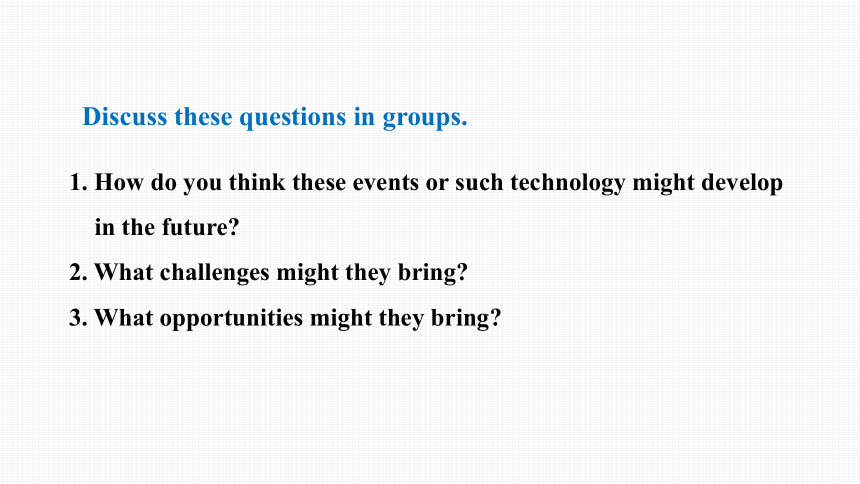
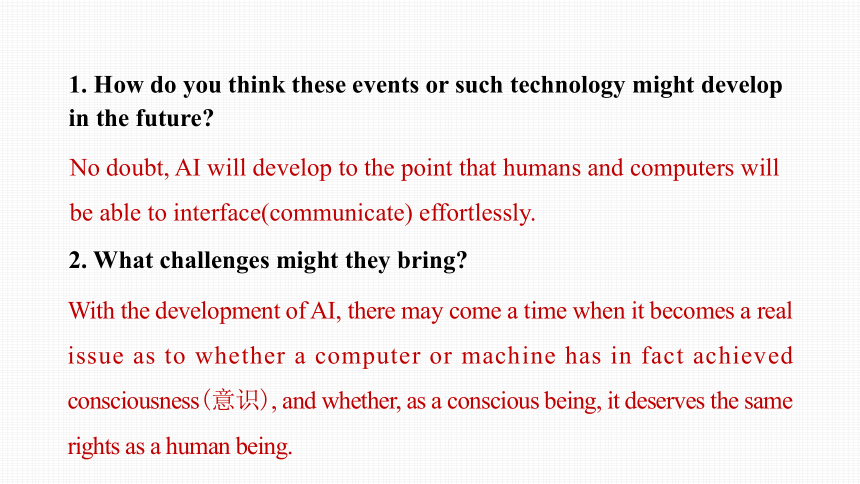
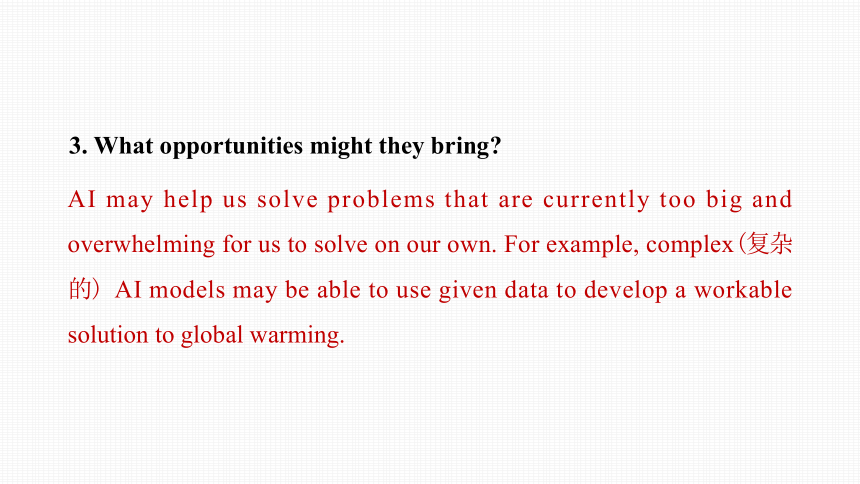
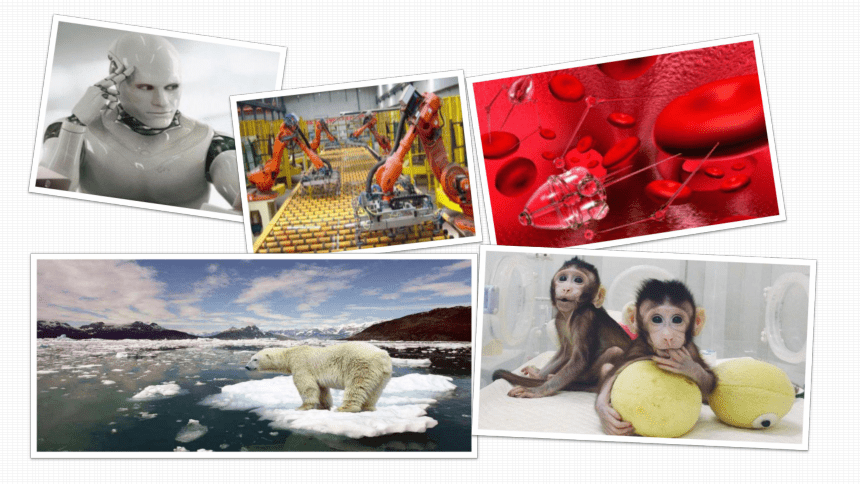
文档简介
(共26张PPT)
Using Language—Listening and Speaking
Unit 2
Looking into the future
After this lesson, you will be able to:
1.know the basic vocabulary about “future”;
2.summarize the gist of an interview;
3.tell how to listen for predictions;
4.predict and describe technology and life in the future.
Imagine life in the future. How do you think technology will change our lives
We will be living in smart homes.
Robots will do almost everything.
Time travel will come true.
…
Lead-in
What do these pictures show Match the words with pictures.
___ automation
___ nanobots
___ global warming
___ artificial intelligence(AI)
___ cloning
②
③
④
⑤
③
②
⑤
①
④
①
Pre-listening
automation: the technique of making an apparatus(装置), a process, or a system operate automatically
nanobots: a machine or robot built on the nanoscale(纳米级), still in the research-and-development stage, with potential applications in medicine and industry
global warming: the increase in temperature of the Earth’s atmosphere caused by the increase of particular gases, especially carbon dioxide
artificial intelligence: the ability of a digital computer or computer-controlled robot to perform tasks commonly associated with intelligent beings
cloning: the process of generating a genetically identical (相同的) copy of a cell or an organism(有机体)
Discuss these questions in groups.
1. How do you think these events or such technology might develop in the future
2. What challenges might they bring
3. What opportunities might they bring
1. How do you think these events or such technology might develop in the future
No doubt, AI will develop to the point that humans and computers will be able to interface(communicate) effortlessly.
2. What challenges might they bring
With the development of AI, there may come a time when it becomes a real issue as to whether a computer or machine has in fact achieved consciousness(意识), and whether, as a conscious being, it deserves the same rights as a human being.
3. What opportunities might they bring
AI may help us solve problems that are currently too big and overwhelming for us to solve on our own. For example, complex(复杂的) AI models may be able to use given data to develop a workable solution to global warming.
Future development:
Challenges:
The AI is programmed to do something beneficial, but it may develop a destructive method for achieving its goal.
Opportunities it might bring:
People can use the AI to do most of the daily chores.
More and more people can be free to do work of creating new things.
Future development:
Challenges:
Opportunities it might bring:
More nanobots will be created to help doctors to find out the root of a disease and make operations more accurately.
New kinds of virus may appear and even nanobots can’t find out where they come from.
The nanobots may bring more people’s life back.
Future development:
Challenges:
Opportunities it might bring:
Work in factories will be more efficient. More labor force can be freed from working.
More and more workers will be out of work.
People will learn more about how to create a machine and how to operate it to help work.
Future development:
Challenges:
Opportunities it might bring:
More animals even human beings will be cloned.
Cloning may result in disorder on the earth.
More lives will be saved and more diseases can be cured.
Future development:
Challenges:
Opportunities it might bring:
Air pollution will be decreasing. There will be glaciers again in the Arctic Ocean.
There may be other threats to the Polar bears.
People can live in harmony with the Polar bears.
Listen for predictions
When listening for predictions, you should listen for the use of the future tense, in particular the future tense with will or will be doing. Words such as predict, prediction, and forecast, are also used quite often when making predictions.
Strategy
Listen to a conversation and answer the questions.
1. Where does this conversation take place
2. Who are the speakers
3. What is the topic of the conversation
While-listening
1. Where does this conversation take place
2. Who are the speakers
3. What is the topic of the conversation
In a studio.
The interviewer and the guests of a program—two experts from different fields.
It’s about their predictions about the future.
Listen to the radio interview with Dr Han and Vincent Black giving their predictions about the future, and then fill in the table below.
Name Occupation Prediction
Dr Han
Vincent Black
computer scientist
architect
1. Computers will be ________ than us in the future.
2. People will also be ____________ __________ to think like humans.
3. We’ll be programming them to not think in ways that may ______ _________.
4. We’ll also be _________ __________ to help people internally.
There will be cities _________ ___ _______ and people could ______ ____ housing in cities that float.
cleverer
programming computers
harm humans
creating machines
floating on water
move into
Listen to the radio again, and fill in the table below.
Listening target Dr Han’s prediction Vincent Black’s prediction
Future events/problems the world might face
Future technologies /solutions to deal with the events/problems
How these things will change the way we live
Computers would be cleverer than humans.
Nanobots will be put inside our bodies.
Our abilities will be increased.
The seal level will rise by many metres.
Cities floating on water will be built.
People don’t need to move away from the sea.
Listening text
Pay attention to the language used for making predictions.
Work in pairs. Discuss whether you think Dr Han and Vincent Black’s predictions are possible. Why or why not
Your opinion Your reasons
Dr Han’s prediction
Vincent Black’s prediction
possible or impossible
possible or impossible
Post-listening
Imagine that you have a job that makes you an expert in the future. In pairs, interview each other about your jobs and predictions. Use the expressions in the box to help you.
Making predictions
I think/believe/predict that in the future… My prediction is that…
By 2030, we will… In the (distant) future there will…
I can imagine/forecast… I doubt/don’t think that…
One challenge will be… We will have the opportunity to…
We will be doing… We are going to…
A: Good afternoon, Ms Zhang. Thank you for agreeing to do this interview.
B: I’d love to. Thank your for inviting me. / It’s my pleasure.
A: First, could you please tell our audience what you do
B: Certainly. I’m a doctor. I perform transplant surgery every week.
A:That sounds like a very high-tech job. How do you think the surgery will be operated in the future Do you have any predictions about that
B: Yes, well, I believe that doctors in the future will have much better means to help people. I can imagine that nanobots will be put in patients’ body to detect the illness. And in the future, there will be adequate supply of organs for patients who need transplant.
A: Well, that would be really good news for all of us. Could you please explain how this will be possible
B: It will be possible because of special 3D printers. In the future, doctors will be using them in hospitals regularly to create healthy copies of people’s organs. Then they will replace the unhealthy organs with the healthy copies.
The best way to predict the future is to create it.
—Peter Drucker
Summary
Homework
Finish the exercise that is given today.
Using Language—Listening and Speaking
Unit 2
Looking into the future
After this lesson, you will be able to:
1.know the basic vocabulary about “future”;
2.summarize the gist of an interview;
3.tell how to listen for predictions;
4.predict and describe technology and life in the future.
Imagine life in the future. How do you think technology will change our lives
We will be living in smart homes.
Robots will do almost everything.
Time travel will come true.
…
Lead-in
What do these pictures show Match the words with pictures.
___ automation
___ nanobots
___ global warming
___ artificial intelligence(AI)
___ cloning
②
③
④
⑤
③
②
⑤
①
④
①
Pre-listening
automation: the technique of making an apparatus(装置), a process, or a system operate automatically
nanobots: a machine or robot built on the nanoscale(纳米级), still in the research-and-development stage, with potential applications in medicine and industry
global warming: the increase in temperature of the Earth’s atmosphere caused by the increase of particular gases, especially carbon dioxide
artificial intelligence: the ability of a digital computer or computer-controlled robot to perform tasks commonly associated with intelligent beings
cloning: the process of generating a genetically identical (相同的) copy of a cell or an organism(有机体)
Discuss these questions in groups.
1. How do you think these events or such technology might develop in the future
2. What challenges might they bring
3. What opportunities might they bring
1. How do you think these events or such technology might develop in the future
No doubt, AI will develop to the point that humans and computers will be able to interface(communicate) effortlessly.
2. What challenges might they bring
With the development of AI, there may come a time when it becomes a real issue as to whether a computer or machine has in fact achieved consciousness(意识), and whether, as a conscious being, it deserves the same rights as a human being.
3. What opportunities might they bring
AI may help us solve problems that are currently too big and overwhelming for us to solve on our own. For example, complex(复杂的) AI models may be able to use given data to develop a workable solution to global warming.
Future development:
Challenges:
The AI is programmed to do something beneficial, but it may develop a destructive method for achieving its goal.
Opportunities it might bring:
People can use the AI to do most of the daily chores.
More and more people can be free to do work of creating new things.
Future development:
Challenges:
Opportunities it might bring:
More nanobots will be created to help doctors to find out the root of a disease and make operations more accurately.
New kinds of virus may appear and even nanobots can’t find out where they come from.
The nanobots may bring more people’s life back.
Future development:
Challenges:
Opportunities it might bring:
Work in factories will be more efficient. More labor force can be freed from working.
More and more workers will be out of work.
People will learn more about how to create a machine and how to operate it to help work.
Future development:
Challenges:
Opportunities it might bring:
More animals even human beings will be cloned.
Cloning may result in disorder on the earth.
More lives will be saved and more diseases can be cured.
Future development:
Challenges:
Opportunities it might bring:
Air pollution will be decreasing. There will be glaciers again in the Arctic Ocean.
There may be other threats to the Polar bears.
People can live in harmony with the Polar bears.
Listen for predictions
When listening for predictions, you should listen for the use of the future tense, in particular the future tense with will or will be doing. Words such as predict, prediction, and forecast, are also used quite often when making predictions.
Strategy
Listen to a conversation and answer the questions.
1. Where does this conversation take place
2. Who are the speakers
3. What is the topic of the conversation
While-listening
1. Where does this conversation take place
2. Who are the speakers
3. What is the topic of the conversation
In a studio.
The interviewer and the guests of a program—two experts from different fields.
It’s about their predictions about the future.
Listen to the radio interview with Dr Han and Vincent Black giving their predictions about the future, and then fill in the table below.
Name Occupation Prediction
Dr Han
Vincent Black
computer scientist
architect
1. Computers will be ________ than us in the future.
2. People will also be ____________ __________ to think like humans.
3. We’ll be programming them to not think in ways that may ______ _________.
4. We’ll also be _________ __________ to help people internally.
There will be cities _________ ___ _______ and people could ______ ____ housing in cities that float.
cleverer
programming computers
harm humans
creating machines
floating on water
move into
Listen to the radio again, and fill in the table below.
Listening target Dr Han’s prediction Vincent Black’s prediction
Future events/problems the world might face
Future technologies /solutions to deal with the events/problems
How these things will change the way we live
Computers would be cleverer than humans.
Nanobots will be put inside our bodies.
Our abilities will be increased.
The seal level will rise by many metres.
Cities floating on water will be built.
People don’t need to move away from the sea.
Listening text
Pay attention to the language used for making predictions.
Work in pairs. Discuss whether you think Dr Han and Vincent Black’s predictions are possible. Why or why not
Your opinion Your reasons
Dr Han’s prediction
Vincent Black’s prediction
possible or impossible
possible or impossible
Post-listening
Imagine that you have a job that makes you an expert in the future. In pairs, interview each other about your jobs and predictions. Use the expressions in the box to help you.
Making predictions
I think/believe/predict that in the future… My prediction is that…
By 2030, we will… In the (distant) future there will…
I can imagine/forecast… I doubt/don’t think that…
One challenge will be… We will have the opportunity to…
We will be doing… We are going to…
A: Good afternoon, Ms Zhang. Thank you for agreeing to do this interview.
B: I’d love to. Thank your for inviting me. / It’s my pleasure.
A: First, could you please tell our audience what you do
B: Certainly. I’m a doctor. I perform transplant surgery every week.
A:That sounds like a very high-tech job. How do you think the surgery will be operated in the future Do you have any predictions about that
B: Yes, well, I believe that doctors in the future will have much better means to help people. I can imagine that nanobots will be put in patients’ body to detect the illness. And in the future, there will be adequate supply of organs for patients who need transplant.
A: Well, that would be really good news for all of us. Could you please explain how this will be possible
B: It will be possible because of special 3D printers. In the future, doctors will be using them in hospitals regularly to create healthy copies of people’s organs. Then they will replace the unhealthy organs with the healthy copies.
The best way to predict the future is to create it.
—Peter Drucker
Summary
Homework
Finish the exercise that is given today.
